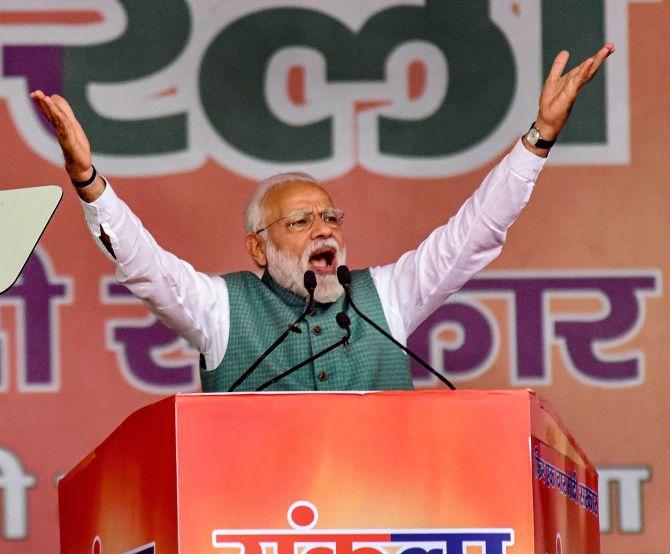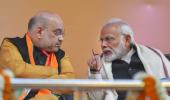'Patriotism won 400+ seats for the Congress party in 1984. How much will nationalism bring in, in 2019, is the question,' asks Saisuresh Sivaswamy.

Finally the moment everyone has been waiting for is here.
India will undertake the largest democratic electoral exercise on Earth starting a month from now, at the end of which we will know who has the mandate to govern this raucous, rambunctious, spirited nation for the next five years.
Pollsters and pundits have spoken, but it is the humble voter who will have the last laugh on May 23. For he will have exercised not merely his franchise, but also sagacity.
As he has been doing in the last 16 Lok Sabha elections and in numerous state elections since 1952. This is the moment for which our forefathers resisted the foreign yoke, to give the citizen the right to elect who will govern his affairs.
At least seven times out of those 16 (in 1989, 1991, 1996, 1998, 1999, 2004 and 2009), the voter did not give a clear-cut mandate to one party. But whatever misgivings one may have had of coalition rule after the disastrous results in 1989 and 1996 were put to rest with the coalitions since then, both under the NDA and UPA, testifying to the fact that a democracy can be a quick learner as well as adapting.
2014 was the first time after 1984 that the nation trusted a single party with a decisive majority. And the question before the nation and the voter is, what will he do now?
That is because unlike five years ago, the frontrunner, Prime Minister Narendra Damodardas Modi (who some consider the only horse in the race), presented himself as a knight in shining armour, riding in on his white steed, determined to steer the country on the right path.
Incumbency is a strange thing, and very much like intimacy in a long-term relationship. It robs one of freshness and novelty, and often the very things that were deemed attractive slowly turn pedestrian and trite.
It is the rare leader who is able to break the shackles of such constriction. The unjustly reviled Dr Manmohan Singh did it, as did Atal Bihari Vajpayee. Before them, you had to go back all the way to Indira Gandhi for seizing the moment decisively, in 1971.
That was an election held under special circumstances, against the backdrop of India's most decisive military win till date. If her life wasn't cut short by assassins in 1984, would Mrs Gandhi have secured an equally decisive mandate?
We will never know, but it is safe to posit that she may have returned to power, faced as she was by the same set of discredited politicians who couldn't handle power, but not with the kind of majority the voter conferred on her son in that election.
The 1984 elections were overshadowed by the threat of secessionism raging across Punjab which rose and peaked during Indira Gandhi's final term in office. Naturally for the Congress, defending the nation's borders from foreign-inspired threats was the central theme of that election, an election motif that has not so far made its reappearance.
Or has it?
Cross-border terrorism has been a constant in India's life since then, but never after 1984 did it become an election issue -- till now.
Punjab then, Jammu and Kashmir now. The arcs are similar, even if the central messaging is different.
So the Congress spoke of the threat to the nation's borders and presented itself as the only one capable of defending it.
While that was a blatant election campaign that pulled no punches on the subject of terrorism and secessionism, the present election campaign is more subliminal.
It is once again dealing with the cross-border threat. Then as now, the enemy remains the same. But Narendra Damodardas Modi's campaign is not about being the only one able to defend the country's borders, but about being the only one to carry the fight into the enemy camp.
That is because while the cross-border threat remains, there is no state of India that is in danger of seceding -- unlike in 1984 when it seemed that the border was about to be redrawn. Today, even the most pessimistic Indian will not paint such a picture.
But the threat emanating from across the border needs to be countered. Not by painting a picture of fear and offering to assuage it, but by invoking the threat and offering to neutralise it.
So even if the danger remains more or less the same, the fear and reassurance from 1984 have been replaced with challenge and action in 2019.
In 1984 it was posited that voting the Congress was the patriotic thing to do; in 2019, it is suggested that voting the Bharatiya Janata Party is the nationalistic thing to do.
Patriotism and nationalism, after all, are two sides to the same coin, just as some say the Congress and BJP are nothing but mirror images of each other.
Election season also brings out the silly season, so not too many questions are raised about how a few cross-border strikes here and there will exterminate a problem the country has been facing for almost three decades, if not longer.
Ever since his rise to the top, Prime Minister Modi has been compared to India's only woman prime minister who was considered the only man in her Cabinet.
So you find the same authoritative nature, the impatience with procedures and a haughty demeanour that went into mythifying Mrs Gandhi, are all back in vogue.
Today, the myth of Modi towers over everything in sight.
Indira Gandhi's finest moment was in 1971, at the head of a military triumph, even though it is the losing side in that war that set the agenda in 1984 and now in 2019.
Modi knows a war is out of the question, even if the distance from nationalism to jingoism is as short as BMKJ. So he has done the next best thing, and created for his voters a fog of war over Balakot.
Patriotism won 400+ seats for the Congress party in 1984. How much will nationalism bring in, in 2019, is the question.










